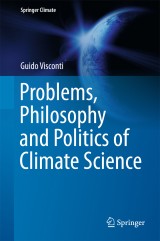Details

Problems, Philosophy and Politics of Climate Science
Springer Climate
|
85,59 € |
|
| Verlag: | Springer |
| Format: | |
| Veröffentl.: | 17.09.2017 |
| ISBN/EAN: | 9783319656694 |
| Sprache: | englisch |
Dieses eBook enthält ein Wasserzeichen.
Beschreibungen
<p>This book is a critical appraisal of the status of the so-called Climate Sciences (CS). These are contributed by many other basic sciences like physics, geology, chemistry and as such employ theoretical and experimental methods. In the last few decades most of the CS have been identified with the global warming problem and numerical models have been used as the main tool for their investigations. The produced predictions can only be partially tested against experimental data and may represent one of the reasons CS are drifting away from the route of the scientific method. On the other hand the study of climate faces many other interesting and mostly unsolved problems (think about ice ages) whose solution could clarify how the climatic system works. As for the global warming, while its existence is largely proved, scientifically it can be solved only with a large experimental effort carried out for a few decades. Problems can arise when not proved hypotheses are adopted as the basisfor public policy without the recognition that they may be on shaky ground. The strong interactions of the Global Warming (GW) with the society create another huge problem of political nature for the CS.</p> <p>The book argues that the knowledge gained so far on the specific GW problem is enough for the relevant political decisions to be taken and that Climate Science should resume the study of the climate system with appropriate means and methods. The book introduces the most relevant concepts needed for the discussion in the text or in appropriate appendices and it is directed to the general public with upper undergraduate background. Each chapter closes with a debate between a climate scientist and a humanist to reflect the discussions between climate science and philosophy or climate scientists and society.</p>
<p>Chapter 1. A summary of the problem.- Chapter 2. How Climate is studied.- Chapter 3. Modelling the Environment.- Chapter 4.- What It Is the Climate Science.- Chapter 5. Experimental data and climate.- Chapter 6.- The Bayes Statistics and the Climate.- Chapter 7. Statistics and Climate.- Chapter 8. Recent developments.- Chapter 9. Some Conclusion.</p>
<div>Guido Visconti is Professor Emeritus at Università dell'Aquila, Italy and a member of the National Academy of Lincei. He has held a Fulbright Fellowship (1968-69), University of Maryland (USA). NATO Fellowship, Dept of Meteorology, MIT, USA, (1976, 1977). NATO Senior Fellowship, NCAR, USA (1986 -1987). He has served as committee member of the Intergovernmental Panel for Climatic Change (IPCC) and Member of the International Ozone Commission (WMO). In his long career he was the Principal Investigator UARS Correlative Measurements Program (NASA) and Atmospheric Effects of Supersonic Airplane (AESA,NASA). He was the author of the book Fundamentals of Physics and Chemistry of the Atmosphere, Second Edition, Springer , 2016.<br/></div>
<div><div>This book is a critical appraisal of the status of the so-called Climate Sciences (CS). These are contributed by many other basic sciences like physics, geology, chemistry and as such employ theoretical and experimental methods. In the last few decades most of the CS have been identified with the global warming problem and numerical models have been used as the main tool for their investigations. The produced predictions can only be partially tested against experimental data and may represent one of the reasons CS are drifting away from the route of the scientific method. On the other hand the study of climate faces many other interesting and mostly unsolved problems (think about ice ages) whose solution could clarify how the climatic system works. As for the global warming, while its existence is largely proved, scientifically it can be solved only with a large experimental effort carried out for a few decades. Problems can arise when not proved hypotheses are adopted as thebasis for public policy without the recognition that they may be on shaky ground. The strong interactions of the Global Warming (GW) with the society create another huge problem of political nature for the CS.</div><div> </div><div>The book argues that the knowledge gained so far on the specific GW problem is enough for the relevant political decisions to be taken and that Climate Science should resume the study of the climate system with appropriate means and methods. The book introduces the most relevant concepts needed for the discussion in the text or in appropriate appendices and it is directed to the general public with upper undergraduate background. Each chapter closes with a debate between a climate scientist and a humanist to reflect the discussions between climate science and philosophy or climate scientists and society.</div><div><br/></div></div>
Provides discussion at the end of each chapter from opposing viewpoints of a climate scientist and a humanist Presents a critical appraisal of the political nature of climate science Highlights the importance of understanding the climate system (not just the GW) and the necessity to enhance the experimental aspects Includes supplementary material: sn.pub/extras
Diese Produkte könnten Sie auch interessieren:

Decision Support Systems for Risk-Based Management of Contaminated Sites

von: Antonio Marcomini, Glenn Walter Suter II, Andrea Critto

96,29 €

Dynamics of Mercury Pollution on Regional and Global Scales

von: Nicola Pirrone, Kathryn R. Mahaffey

149,79 €














